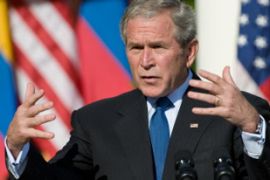Bush pushes $700bn bail-out plan
US treasury to use taxpayers’ money to buy bad debts from financial institutions.

Bush urged congress to work quickly to approve the measures.
Plan details
The US treasury later unveiled details of the plan. It said that the Bush administration was requesting the “authority to issue up to $700bn of Treasury securities and whole loans”.
The plan would give Henry Paulson, the treasury secretary, the authority, in consultation with Ben Bernanke, the chairman of the federal reserve, “to purchase other assets, as deemed necessary to effectively stabilise financial markets”.
The treasury said: “Removing troubled assets will begin to restore the strength of our financial system so it can again finance economic growth.”
|
“The risk of doing nothing far outweighs the risk of the package and … over time we are going to get all of the money back” George Bush, |
Therefore, the plan would give the government broad power to buy the debt of any US financial institution for the next two years.
Decisions by the treasury secretary related to the buyback programme could not be reviewed by any court, according to draft legislation.
The US government’s debt limit would also increase from $10.6 trillion to $11.3 trillion to make room for the massive bail-out.
The proposal does not specify what the government would get in return from financial companies for the federal assistance.
Congress leaders have promised swift action on the bail-out package, although some of the details are still being worked out.
Steny Hoyer, the Democratic leader in the House of Representatives, said the chamber would probably take up a bill to implement the plan early next week.
Nancy Pelosi, the House speaker, said legislators would stay in town past their hoped-for adjournment next Friday, if needed, in order to pass it.
‘Jail-out’
But while stock markets have risen in expectation of the “bold” government action, critics have called for stronger action against those whose actions have led to the crisis.
“What we need is not just a bail out, but a jail-out,” Danny Schechter, a filmmaker and author specialising in the US economy, told Al Jazeera.
“We need the prosecution of wrongdoers because these people took advantage of so many people who are [now] facing the loss of their homes and the loss of their hope.”
“First, it’s the greed of the Wall Street firms … but right behind are the regulators who didn’t regulate [and] also our media, which didn’t blow the whistle and didn’t investigate these sub-prime and sub-crime transactions,” Schechter said.
An official from the US treasury said that hedge funds and non-US financial institutions would not be allowed to offload their troubled assets on to American taxpayers under the plan.
Candidate criticism
During the crisis of the past week, presidential candidates Barack Obama and John McCain have been critical of the Bush administration’s actions, but niether have offered a clear alternative to the bail-out package.
 |
| Bush’s interventionist pacakge comes amid turmoil in financial markets [AFP] |
McCain, the Republican presidential hopeful, criticised the US treasury for taking a haphazard approach to the crisis.
“Any action they take should be designed to keep people in their homes and safeguard the lifesaving of all Americans by protecting our financial system,” he said.
Obama, his Democratic rival, said “tough oversight and accountability” was needed on Wall Street.
“John McCain’s wrong, we need regulation that makes sure these folks aren’t taking wild risks with other people’s money and then expects for us to bail them out,” Obama said.
Safe corner
The US treasury on Friday also said that it would siphon up to $50bn from a fund established in the 1930s to conduct foreign exchange market intervention to support the US money market mutual fund industry.
The industry, a long-safe corner of financial markets and home to about $3.5 trillion of deposits, has increasingly appeared at risk of falling victim to the year-old credit crunch.
A panic in money markets set in on Tuesday, when the Reserve Primary Fund, a fund whose assets had tumbled 65 per cent in recent weeks, fell below $1-a-share in net asset value.
The drop was triggered as a result of losses on debt issued by Lehman Brothers, the US investment bank that filed for bankruptcy last week in one of the most high profile crashes of the current financial crisis.